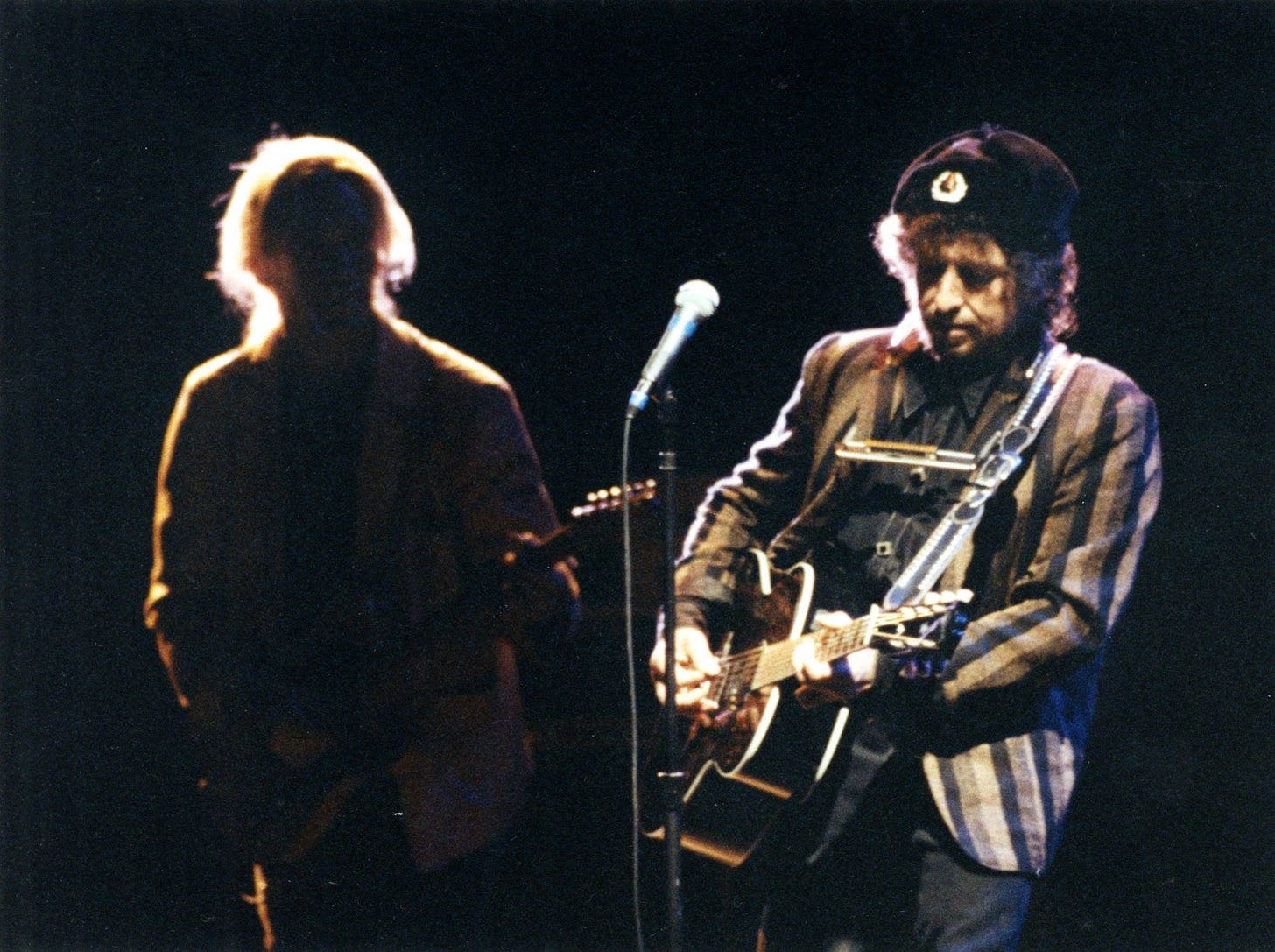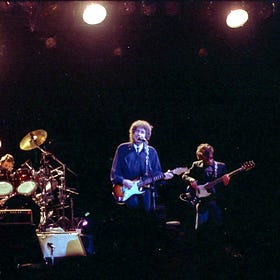Washing the Spit Out of Bob Dylan's Microphone
"I got yelled at for interacting with [Dylan]"

Brian Willis was a sound tech for Dylan only for a brief period, about a month spanning August and September 1990 when Dylan toured the U.S. and Canada. This is not one of Dylan’s more beloved touring eras for fans, and Willis found the backstage vibes pretty grim too. Willis, as he explains, got out of the touring biz pretty quickly after this experience. He is now Head Carpenter for the Boston Lyric Opera.
Fair warning: This one is pretty in the weeds about how the whole touring operation works. I find this sort of thing really interesting, but if you’re looking for amazing behind-the-scenes Bob Dylan stories, this might not be the one for you. (There is a book, however…)
If, on the other hand, you’ve always been clamoring to hear from the guy who washes the spit out of Bob Dylan’s microphone every night, read on.
What was your day-to-day role as a sound tech?
Well, here in Boston I played monitor engineer for a lot of local bands. I moved up the chain to be a professional monitor engineer for bigger acts. So that’s what I was when I joined Audio Analyst, an assistant monitor engineer. “A3,” which is an audio assistant to an audio assistant; an engineer would be A1. So they put me on as an A3, basically as a technician, and I could mix monitors for the opening act.
That’s where I was hired on for. I had interviewed with Audio Analyst to go out with New Kids on the Block as the monitor assistant, but after the interview they called me and asked me if I wanted to do Dylan instead.
That’s a real jump from New Kids on the Block to Bob Dylan.
Exactly. They flew me out to Plattsburgh, New York, to their warehouse and basically I was putting together a tour package out there. I was there two or three weeks or something like that. We put together the package, and then that package went to Edmonton [for the first show, August 12].
This is a basic question maybe, but what does putting together a package mean? What were you doing in Plattsburgh exactly?
Basically putting together all the microphone cables, all the snake boxes. You prelabel them, label all your cables for your standard stage set up, run them all out, set up a drum kit, run all the wires, make sure everything worked. We basically built a package for the whole band and tested everything in the warehouse before we packed it all up and put it on the truck.
So where do you go after Plattsburgh? What happens next?
After Plattsburgh we end up in Edmonton. We worked at the theatre for a couple of days. That’s where I kind of met everybody. I remember that couple of days very clearly. This guy by the name of Rocky, the monitor engineer for Mellencamp, was basically my boss. Me and Rocky didn’t hit it off very good. I ended up really despising the job, honestly.
It wasn’t for you?
I was 28, 29. I had spent most of my career at that point working with people that I really liked to be around. If I didn’t like to be around them, I just didn’t bother. And here I am stuck on a tour bus that’s seven and a half feet wide. Add all the drugs and alcohol you can into that space, and ten Type A personalities, and it’s an interesting ride.
This is like a crew bus with all the sound, lighting, those sorts of people on it?
It was just one crew bus. The band had a bus for G.E. and Tony and co, and then Dylan had his red bus that always kept breaking down. It broke down three times on the tour. The first opening act, a band called Wire Train, I really ended up really liking. I hung out with them, because I didn’t want to be on my bus. They were from San Francisco. They never quite made it. There’s a song called “Tin Jesus” that was pretty popular at the time. I play their music all the time. My wife hates it.
We did maybe 20 stops. It started in Edmonton and ended in Phoenix. By the time Phoenix was done, I had given notice and quit. And I never did it again. I never became a monitor engineer. I had had enough.
So what were you doing at the actual venues? Like the bus pulls up, you get out, what does your job look like?
My job would be to unload the truck, get the stuff out, get it either staged in the venue or at least on the dock waiting for lights to be done. The first truck would have been lights and that kind of stuff, and my truck had band gear and sound on it. It was just a two-truck tour. It was amazing how small that was. Now very few people tour with just two trucks.
Once that was done, I would work with Rocky and we’d stack the speakers, then I would wire the stage. My job was to take care of all the microphone cables, all the microphones, check on the inventory, make sure Bob’s mic had been washed out and cleaned. We had three SM58s that he used. He was using one, one was drying, and one I’d be cleaning out.
The way he talked down into his microphone when he was singing, the drool was kind of overwhelming. If you take apart an SM58, there’s like a little piece of foam or windscreen underneath it. It was just soaking wet. So I’d take that apart every day and wash it out. Otherwise it would start stinking.
Full of spit, huh?
Exactly. It’s very particular to people that sing down into the microphone. Any of the other microphones on stage didn’t need that kind of cleaning. Because his particular style at the time, he’d play harmonica, and then just look at the ground.
I found that very weird that he never looked at anybody. I found it very odd in that situation. For so many years, I was kind of a monitor guy, so I’m kind of friends with everybody on stage. I mean, the band wants to talk to me to tell me what they want. All of a sudden, it is so different. There’s a clear line between the A people and the B people.
Did he literally never say a word to you that whole month?
He never said a word to me. It was very odd. There were a lot of unwritten rules or un-talked-about rules.
My job was just to make sure everything was right. If it was a bad mic cable, I would deal with it. But guitar, anything like that, Cesar [Diaz] would take care of. Or the drum tech.
Were you the guy who’d be scurrying on stage if a cable’s making noise or fixing an amp or something?
You would almost never see me on stage during a show. If you saw me on stage, there was a serious problem. In that day and age, there was a lot of wires that could go bad. It’s changed it with technology now. But back then, if a mic cable went bad, that would be something for me to replace. Any wires that we needed, any supplies that we needed for microphones, any microphones that were broken, whatever. My job was to keep it inventory and keep it current.
I remember being on stage once. This guy jumped up on the stage. Security didn’t quite catch him. I was next to the speaker stack hiding, and I didn’t quite know what to do. I was trying to tell the guy to leave. This drum tech came over and grabbed the guy and slammed him to the floor. He deserved it, but it was just kind of shocking to see the other tech slam to the ground before security could get him. I don’t feel any mercy for people climbing up on stage at all.
G.E. Smith was an incredibly nice person to be around. He was the nicest person on the whole tour. I mean, Bob didn’t do all but one sound check the whole tour, I think. But G.E. would come out and play for as long as they’d let him on the stage. I’d be center of house with only like five, six people listening to him just having a great time playing. He so enjoyed it.
You said Dylan didn’t soundcheck except for one time. What was the one time?
I can’t remember the city [Tulsa], but for some stupid reason, the show was on a floating stage. On the Arkansas River.

[Side note: Dylan was not a fan of the floating stage. From a Tulsa World retrospective: “In 1990, Tulsa World music critic Cathy Milam described Bob Dylan’s singing style as ‘mush mouth’ after his lackluster amphitheater show. His manager took issue with Milam about the review, saying that Dylan HATED the floating stage along with the bugs blowin’ in the wind – and into his mouth.”]
I only remember it because I had a run-in with him backstage.
What happened?
I had just put some stuff away in this closet and left the light on. It was a really small stage, and I had some amp rack cover or something I was trying to hide, just to get it out of the way. I went back to the closet carrying something and I’m saying to myself, “Who shut the stupid light off? I was just here.” Just babbling to myself.
I go in and put the light back on, and he’s sitting on a road case. In the dark. All by himself.
I got yelled at for interacting with him. It was weird. They were like, “You can’t talk to him!” It was like, I didn’t know he was there, and I kind of cursed him out. But I didn’t even know he was in the room.
So you were giving someone grief for turning the light off? And it turned out it was him?
Yeah. I got spoken to for speaking to him. I had to explain to my boss that I didn’t actually speak to him. I was like, “I did not mean to talk to him. If I had seen him, I would have left and walked away.” It wasn’t like I walked into his dressing room.
Another time I got talked to, which is very odd, G.E. Smith asked me to go get something out of the band bus. So I went out to the bus and I walked by somebody sitting at the table in the bus. I went to the back with the bunks, and I got what G.E. wanted.
I started walking back out and I looked up. Bob was sitting there. As I looked up, I just said, “Hi” and walked by. They weren’t happy with that either.
Who is they? Who is enforcing this insane rule?
The tour manager. Again, it was totally incidental. But both times it was like, “You can’t talk to him.” I was like, I don’t really care anymore. I’d rather never see him again.
That seems like what they would call a bad workplace these days.
Yeah. It just wasn’t a good fit. I knew it. Everybody else knew it. We just had to get through that tour. I’m not sure what anybody else ever did. I never kept in touch with anybody.
Is there anything else about that tour you wanted to mention that we didn’t get to?
Not really. I remember a really crappy day in Hannibal, Missouri. That was a horrible stage. Just a horribly designed venue. The stage wasn’t really a stage. Power was bad. The help was bad. It was hot and sticky. The promoter really didn’t really have his shit together to actually have Bob Dylan in this field that we were in.
We had really crappy days. Those kind of stick out. And some really nice days, like playing The Gorge, that sticks out. But I was so glad it was over.
1990-09-04, Riverpark Amphitheater, Tulsa, OK
Thanks Brian! Here are some more interviews with Never Ending Tour era crewmembers about life on the road with Dylan:
Burning CDs and Printing Lyric Sheets for Bob Dylan
Behind-the-scenes people often never been interviewed before, so they have never-told stories to share. I’ve collected some touring-personnel interviews…
Interview: Mark Spring, Dylan's First Never Ending Tour Stage Manager
As a subscribers-only bonus to the big interview with tour manager Richard Fernandez, here’s a shorter interview with Mark Spring.
Stories from Bob Dylan's First Never Ending Tour Sound Crew
Last fall, I did a couple interviews with people on the road with Bob Dylan during the very first shows of the Never Ending Tour in 1988…




So, I'm curious; is Willis a bobcat, or had he been before he worked with his crew? Did Bob rat the guy out and that's why he got scolded, or what? He doesn't come off as bitter against Bob, but he doesn't seem particularly enamored with Bob (as an artist, anyway).